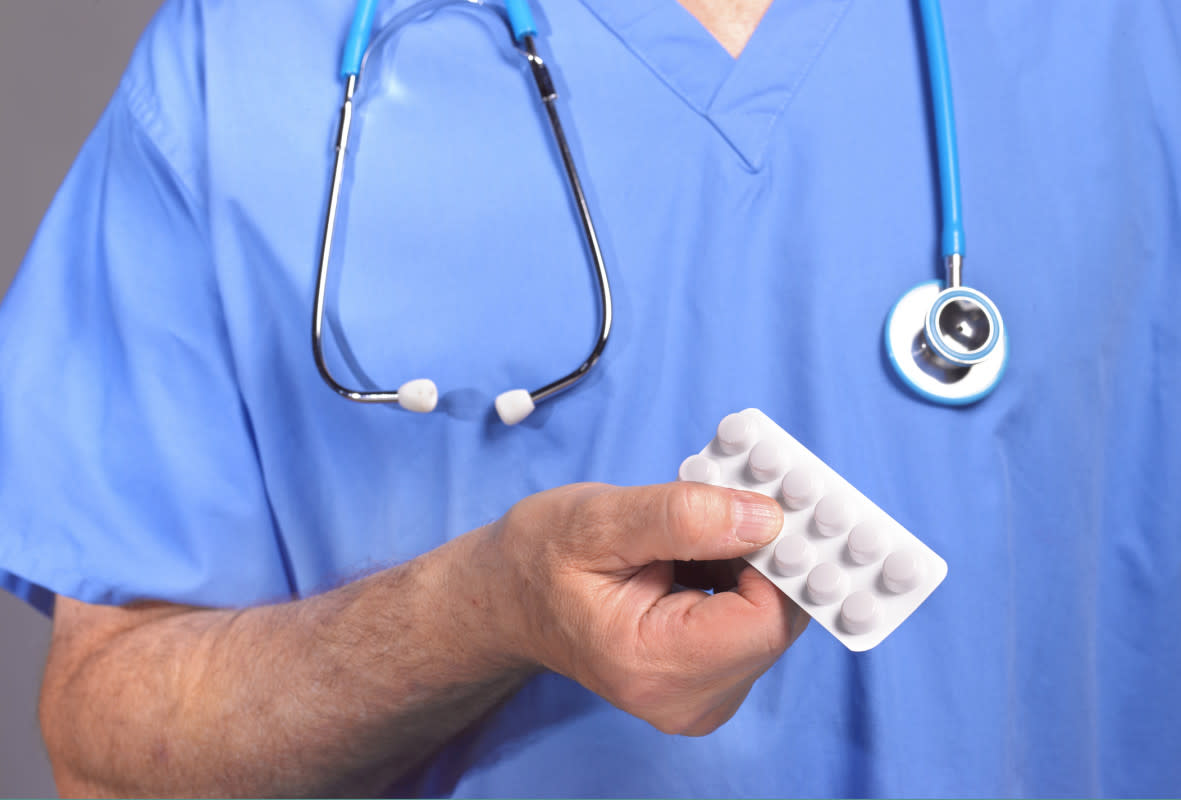The #1 Mistake To Avoid When Taking a Cholesterol Medication

Having high HDL cholesterol is one of the biggest risk factors for experiencing a stroke or heart attack. While having a healthy diet and lifestyle habits in place can help keep cholesterol in a healthy range, prescription medication (primarily statin medication) can also play a crucial role in lowering it.
Most people who are prescribed a statin medication need to take it for life. If they stop, their LDL cholesterol will rise back up. As with any medication, it’s important to take cholesterol medications correctly. This includes knowing when to take them, any foods or drinks you should avoid taking them with and what to do if you forget to take it.
Related: This Is the #1 Sign That Someone Has a Healthy Heart, According to Cardiologists
When Is It Helpful To Take a Cholesterol Medication and How Does It Work?
Not everyone needs to take stain medication to manage their cholesterol. According to the U.S. Preventive Services Task Force, if you are between the ages of 40 and 75 and your risk of developing atherosclerosis (a chronic disease that causes plaque to build up in the arteries) within the next decade is 10% or greater, it’s recommended to consider taking a statin medication. This risk is determined using a cardiovascular risk calculator which takes into account factors including age, race, gender, blood pressure, smoking history and diabetes. If you do not know what your risk for atherosclerosis is, talk to your doctor so you can find out.
“The first group of people who should consider taking a statin is anyone who has had a heart attack, stroke, bypass surgery or stent,” says Dr. David Davidson, MD, a cardiologist at Endeavor Health NorthShore Hospitals. The second group of people who should consider taking a statin, Dr. Davidson says, are people with high LDL cholesterol, which is defined as being above 190 and not due to an underlying health condition, such as a thyroid issue. Dr. Davidson says that people with type 2 diabetes may also want to consider taking a statin medication.
Cardiologist Dr. Tracy Paeschke, MD, FACC, explains that all cholesterol medications work by decreasing cholesterol plaque formation. “Some cholesterol medications, like statins, are anti-inflammatory, meaning they decrease inflammation in plaque helping stabilize the plaque and make them less likely to rupture and cause an acute event, like a stroke or heart attack,” she says.
The #1 Mistake To Avoid When Taking a Cholesterol Medication
Deciding to take a cholesterol medication is a conversation you should have with your healthcare provider. They are also the best person to ask if you have any questions about your medication—especially if you are taking any other medications and you worry about how they may interact. That said, there are general guidelines when taking cholesterol medication that are helpful to know.
When it comes to the best time of day to take your cholesterol medication, it depends on the type of medication you are taking. “Short-acting statins are best taken in the evening, while long-acting statins, such as rosuvastatin, can be taken at any time of day. The most important thing is to remember to take your medication consistently and at the same time each day,” says cardiologist Dr. Nieca Goldberg, MD.
One big question many people taking a cholesterol medication may have is what to do if they forget to take it. If taking a cholesterol medication is new for you, you may not be used to taking it, causing you to forget. Or perhaps you were traveling or had a particularly busy day, throwing off your routine. Fortunately, if you forget to take a dose, Dr. Paeschke says it shouldn’t impact your cholesterol levels too much.
All three cardiologists warn against doubling up on your medication the next day to make up for missing a dose. Instead, they emphasize that you should just take one dose as normal. Taking high doses of statins can cause rhabdomyolysis, which can cause extreme muscle pain, liver damage, kidney damage and even death.
Dr. Davidson says that it’s also important to avoid taking a statin medication with grapefruit or grapefruit juice. This is because grapefruit juice contains a chemical called furanocoumarin, which can prevent the statins from being broken down in the body correctly, causing there to be too much of the statin in the body. Otherwise, all three doctors say that statin medications can be taken with or without food.
Besides grapefruit juice, Dr. Goldberg says that cholesterol medication should not be taken at the same time as Paxlovid, an oral antiviral agent for COVID-19. “Paxlovid can interact with some statins and increase cardiovascular risk so it’s recommended to withhold statins during Paxlovid treatment,” she says.
It bears repeating that if you have any questions about if a cholesterol medication is right for you or have questions about the best way to take it, you should ask your healthcare provider. When taken correctly and when needed, cholesterol medication can be lifesaving.
Up Next:
Related: High Cholesterol Can Be Genetic—Here’s How To Know if That’s the Case for You
Sources
Dr. David Davidson, MD, a cardiologist at Endeavor Health NorthShore Hospitals
Dr. Nieca Goldberg, MD, cardiologist at NYU Langone Health and Clinical Associate Professor of Medicine at NYU Grossman School of Medicine
Dr. Tracy Paeschke, MD, FACC, a double board-certified cardiologist with over 25 years of experience

 Yahoo Lifestyle
Yahoo Lifestyle 
